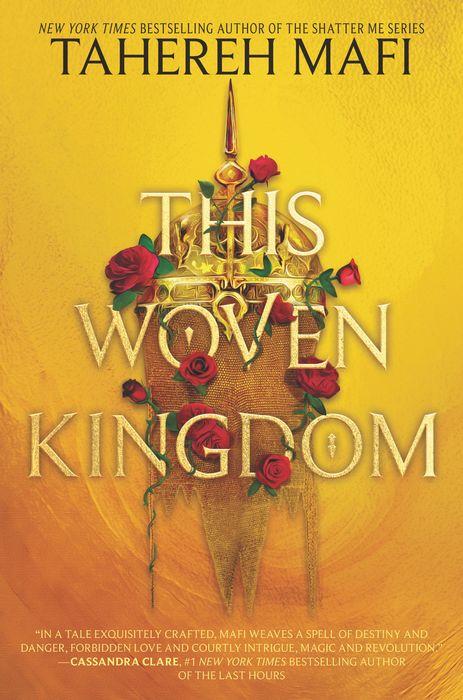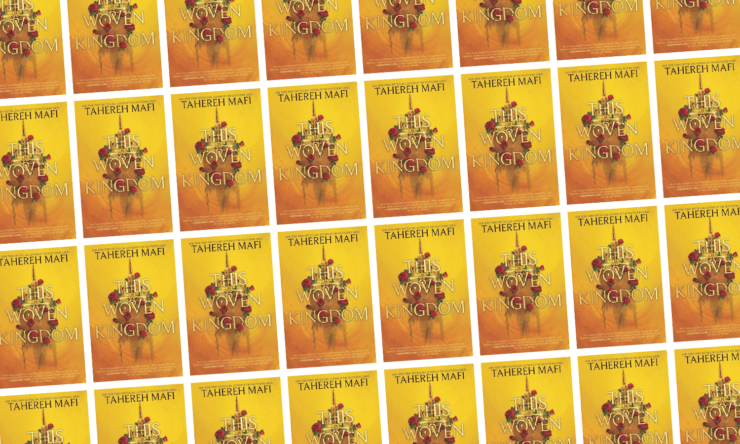In the world of Tahereh Mafi’s latest YA fantasy novel, This Woven Kingdom, a cautious peace has been achieved between humans and their predecessors, the Jinn. The Fire Accords, set up by the current Ardunian king make it so that the Jinn can live amongst humans, but must keep to themselves and not display any of their powers. Humans of course, currently run the world and can do as they please, so of course this is still a world with economic disparity, war and strife.
Alize is a young Jinn woman who lives Cinderella-style in the city that is home to the Ardunian monarchy. She warms herself in the hearth, spends her days cleaning the Duchess’ massive home, her nights sewing dresses for other rich humans so that maybe one day she can actually earn a little money and be free of the constant abuse heaped upon her as a domestic servant. Her parents have been killed, but had raised her to believe that she was vital to the Jinn race’s future, and though she feels completely alone without a friend in the world, she is mostly stoic, sensible, kind and extremely talented with a pair of scissors and a needle—in more ways than one. She’s also a survivor, with ice in her blood and her eyes—something that causes her to look unique and be a special jinn, somehow. She just isn’t sure in what way, but in order to keep surviving, she knows she must remain low key and hidden from everyone.
Though she has spent years hiding away her true self, she is spotted one day by Prince Kamran, the returning grandson of the king and heir to the throne. Kamran is immediately besotted by her and their fates are inexplicably intertwined in the single moment that he lays eyes on her.
Buy the Book


This Woven Kingdom
Why does Kamran suddenly fall for a complete stranger? Who knows! It’s insta-love! Or perhaps kismet, as they’d say in the old tales. When Kamran finds out that Alizeh is part of a prophecy that will destroy his family and his kingdom, he bitterly (and unsuccessfully) convinces himself to forget about her and instead go through the motions expected of him—choose a bride at a ball, proceed to father an heir to the throne, and eventually succeed his grandfather as king.
Alizeh, in the meanwhile, is paid an occasional visit by the devil—or Iblees as he’s called here, since Mafi is leaning into Islamic tradition. Iblees likes to leave behind complicated little riddles for Alizeh to stress over, and while we are explained his relevance to the Jinn, we don’t really know what his greater interest in Alizeh is. Probably something to do with the vague promise of her being destined to inherit the (currently defunct) Jinn kingdom.
In the midst of some zen-level patience for the humans who abuse her while she (literally) works herself raw for them, Alizeh finds herself invited to the royal ball, with a fabulous gown and matching magic shoes brought to her by a stranger with whom she seems to share a mutual friend.
Who is this handsome, cocky stranger? Shall Alizeh make it to the ball? Will Kamran find her there and defy all odds to choose her over the many eligible young women paraded before him, risking peace and maybe even his grandfather? What does Alizeh really know about herself, and what isn’t she telling us? Why does a creature of fire have ice in her blood? Will everything that needs to be sorted be sorted before the clock strikes midnight?
Most importantly, for a book being heavily touted as inspired by the Shahnameh and Persian mythology, why does This Woven Kingdom constantly feel like a standard western fairy tale?
A lot about this story feels familiar—perhaps for the majority of western readers, the lukewarm Persian setting is unique enough for them to not be bothered by the familiarity of the plot; perhaps just the idea of jinns and the genuinely lovely illustrated chapter headings with Persian numbers (spelled out in Arabic text!) are exotic enough to make up for the lack of any depth in the actual mis en scene of the novel.
But here is another reader very familiar with the source material, to whom the setting isn’t going to seem particularly Persian, not for all the charming mentions of pomegranates and tea in hourglass shaped glasses. The characters may have Persian names, and sometimes speak some Persian, and while that’s a refreshing approach, the actual story feels very… Disney. Should it be enough to be told the setting is Persian, or that the source material is the Shahnameh, for a reader to imagine castles that are not the classic western ones featured so heavily in fantasy and pop culture, for example? To let go of those mental images that come from a powerful colonial hangover is a heavy skin to shed, and it feels like perhaps we needed a little more than Mafi has given us.
Willing suspension of disbelief didn’t come easy with This Woven Kingdom, as eloquent as Mafi’s writing can be. The very fact that Alizeh is meant to have powers like invisibility, super speed and strength, that she is a skilled fighter and a strong, capable woman makes it unbelievable that she’d opt to hide in plain sight as a servant who is constantly threatened and beaten. To be fair, Mafi has Kamran as the same question, and the answer is that Jinns have been reduced to this, and that Alizeh is safest from any attacks if she hides as a nameless, faceless disposable servant. But not every reader will be as easily convinced as Kamran. Is Alizeh simply an unreliable narrator, a much more interesting and complicated character with many dark secrets who is not revealing her true self? Perhaps, and yet…no, because we do not see this play out ever during the course of the entire novel.
There are quite a few things we don’t see the reason for during the course of the novel. Perhaps this is because This Woven Kingdom covers a very short time span—literally only a few days—and while we are given backstory for the main characters, and history for the world it is set in, there is very little actual plot here. The book constantly feels very much like a rather long set up for a second (and/or third) novel, rather than a complete novel in itself.
Tahereh Mafi’s 2018 novel A Large Expanse of Sea and 2021 novel An Emotion of Great Delight were both both non-fantasy YA, and both just wonderful, emotive stories of the lives of migrants. Her earlier YA novels have proven to be extremely popular, and no doubt This Woven Kingdom trilogy will be, too.
This Woven Kingdom is published by HarperCollins.
Read an excerpt here.
Mahvesh loves dystopian fiction and appropriately lives in Karachi, Pakistan. She writes about stories when not wasting much too much time on Twitter.










